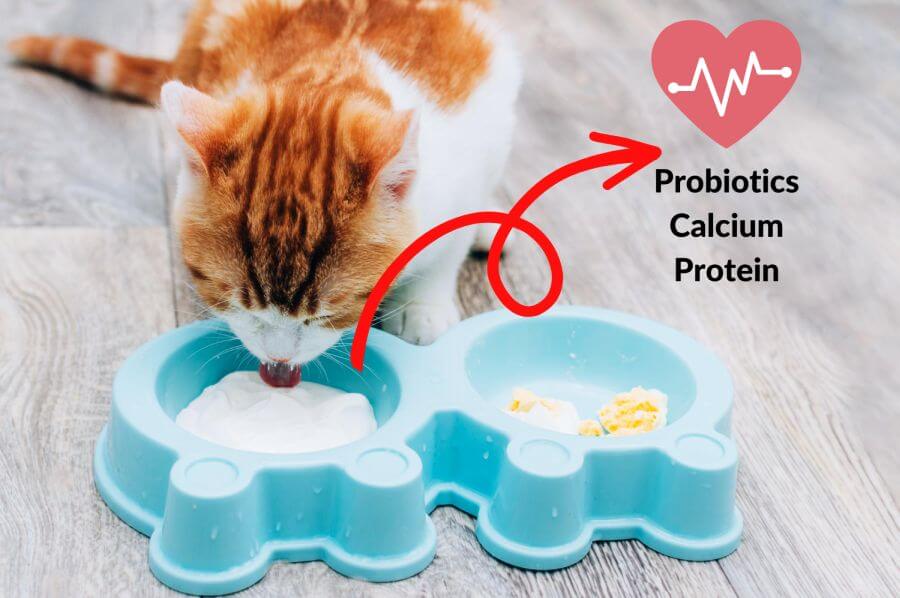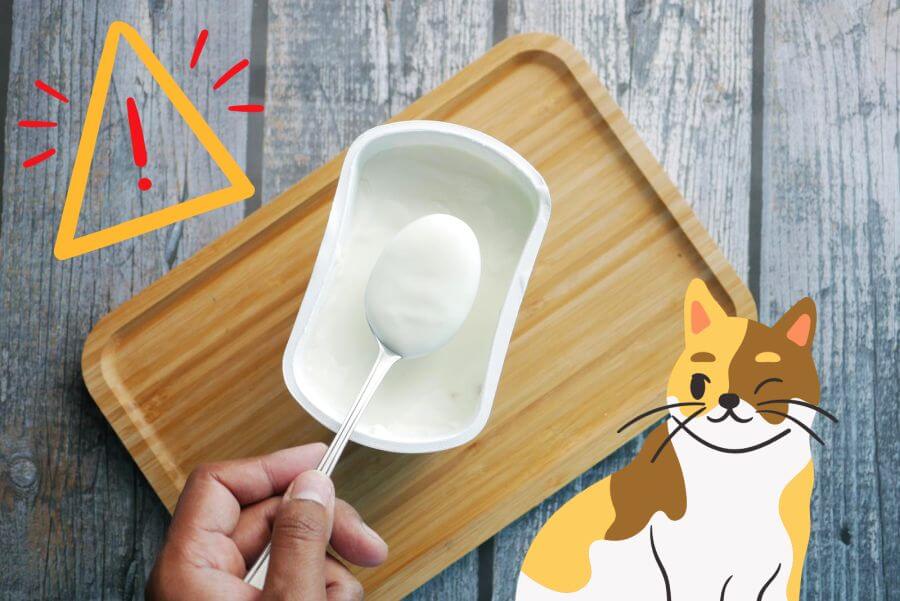The Kitty Key Takeaways
- So here’s the scoop: Mr. Whiskers can safely lap up yogurt – but oh, do hold on a minute! Not all yogurts are created equal, and certainly not all are cat-friendly ✔️
- The star of the cat-yogurt show? Plain, unsweetened Greek yogurt, chock-full of live bacteria. It’s not just yummy but also nourishing, bolstering Mr. Whiskers’ digestion and providing him a protein and calcium boost 💪
- Now, here’s the flip side – some yogurt brands pack in additives that are a no-go for cats ⚠️ Also, you might want to remember, some cats can have a tummy-turmoil with dairy, including our creamy buddy here, yogurt ⚠️
Some Types of Yogurt Are Beneficial for Cats
You’re probably thinking, “Wait, you just told me yogurt can upset my cat’s stomach!” Absolutely right, but hear us out – not all yogurts are off the table. Some can be real treats for our feline friends. Take live-culture yogurt, for instance. It’s brimming with probiotics that can bolster Mr. Whiskers’ digestive health and jazz up his immune system function.

Just beware of those yogurt brands that whisper sweet nothings of health benefits. It’s not always the cat’s pajamas! Flavored yogurts, like vanilla or strawberry, can harbor a sugar overload and other additives that are simply cat-astrophic. When it comes to kitty treats, always opt for the unsweetened, unflavored kind.
Can Cats Eat Yogurt Safely? Health Benefits of Yogurt
Now, the elephant in the room: can cats eat yogurt safely? Actually, yea! While it’s always smart to check with your vet before introducing any new food to your cat, many cat whisperers believe that cats can relish yogurt without a hitch, and it can help maintain a purr-fect gut balance.
But yogurt isn’t just about good bacteria! It’s also a protein, calcium, and vitamin B12 powerhouse. If Mr. Whiskers has been on antibiotics, a bit of yogurt can help restore his gut bacteria balance.
Proceed with Purr-caution!
If you’re on board the cat-yogurt train, always ensure you’re feeding your kitty sugar-free yogurt teeming with live and active probiotic cultures. Flavored yogurts are a no-no, as they may contain dodgy additives and artificial colors.

Remember, Mr. Whiskers’ diet should be predominantly high-quality cat food. Yogurt is a special treat, not a main course. As with any new food, be on the lookout for any adverse reactions. If you see signs of an allergic reaction like vomiting, diarrhea, excessive scratching, or licking, hit pause on the yogurt treats, and reach out to your vet ASAP.
How Much Yogurt Can I Give My Cat?
As with all good things, moderation is key! Start with a tiny taste test – a teaspoon of yogurt should do. If Mr. Whiskers doesn’t show any signs of discomfort, you can gradually offer more. Always make sure fresh water is available for your kitty, especially when trying new foods.
Cats and Lactose Intolerance: The Dairy Dilemma
Can cats eat yogurt if they’re lactose intolerant? No. Dairy products, including yogurt, can trigger an unpleasant response. So, if you notice any signs of discomfort after Mr. Whiskers has enjoyed his yogurt treat, it’s time for a vet chat about a potential dairy allergy or intolerance.

But! Greek yogurt may be okay for some cats with lactose intolerance, as it contains less lactose than regular yogurt, milk or ice cream. Besides, there are also plenty of lactose-free options!Still, offer it in moderation!
What Kind of Yogurt Is the Safest for Cats to Eat?
While yogurt is generally safe for cats to eat, it’s important to make sure that you give them the right type. Look for yogurt that is low in sugar and devoid of artificial sweeteners, flavors, and colors. Plain yogurt is best, though some cats may want to steal flavored varieties as well – don’t let them! Always avoid yogurts with added fruits or nuts, as these can be dangerous for cats. The best type is Greek yogurt, which is high in protein and low in sugar. It also doesn’t contain much lactose.
Can Kittens Eat Yogurt?
Not all yogurts are created equal for kittens. Go for low-sugar, unflavored, and color-free options. The prime pick? Greek yogurt! It’s high in protein, low in sugar, and doesn’t contain much lactose. And remember to adjust the amount to the kitten’s size (starting with 1 teaspoon for the tiniest fella).
Final Thoughts: Can Cats Eat Yogurt?
Despite being a carnivore, can cats eat yogurt? Yes, a little dollop of Greek yogurt can be a wonderful treat, adding some protein and probiotics without compromising taste.
Always remember, though, the lion’s share of your cat’s diet should be meat-based. While yogurt is fine in moderation, don’t let it replace their balanced cat food. Overfeeding yogurt can lead to tummy upsets, so remember, small is beautiful – think 1–2 teaspoons at a time. If you suspect your cat is intolerant or allergic to yogurt, halt the yogurt snack-times, and check with the vet.
Frequently Asked Questions
What Happens If a Cat Eats Yogurt?
Well, it could either get a bellyache or enjoy a health boost by regulating their gut bacteria. Remember, only plain, unsweetened yogurt is feline-approved.
Is Greek Yogurt OK for Cats?
Yes, it’s rich in protein and calcium – essential nutrients for your kitty. But ensure it’s free of sugar, sweeteners, flavors, or additives.
Why Do Cats Love Yogurt?
Cats have a nose for animal fats and proteins, which yogurt is full of. Plus, the calcium and probiotics are bonus health benefits. Yogurt is also relatively low-calorie, so it’s a purr-fectly tasty treat!
Similar Posts:
- Can Dogs Eat Yogurt? Greek vs. Regular Yogurt
- Do Cats Drink Milk? Do Cats Like Milk? The Truth About Whether You Can Give Your Cat Milk or Not
- Can Dogs Eat Sour Cream? How Much Sour Cream Can You Give Your Dog?
- Can Dogs Eat Cheese? Is It Safe for Dogs?
- Can Dogs Eat Ice Cream? How to Safely Feed Your Dog Frozen Treats?
- Can Cats Eat Ice Cream? Do Kittens Get Brain Freeze?
- What Human Food Can Cats Eat? 7 People Foods for Cats
- Can Dogs Eat Whipped Cream? Is Starbucks Puppuccino Bad for Dogs?

